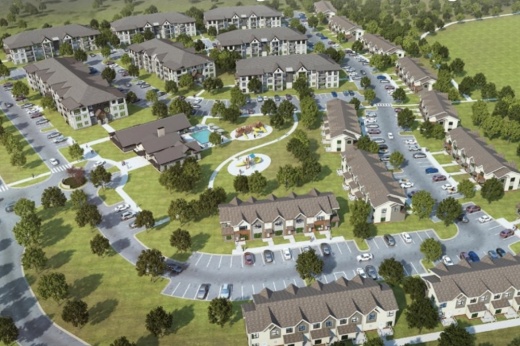The gist
Dominium, a multifamily housing developer, applied for a 4% tax credit to build an apartment complex and provide additional workforce housing in Georgetown. To move forward with the plan, the Texas Department of Housing and Community Affairs, which issues tax-exempt bonds used to fund for-profit and nonprofit affordable rental developments, required the city to pass a resolution of either no objection or support for the project. After a lengthy discussion, council members approved the measure 4-3.
Those in favor
- District 1 Council Member Amanda Parr
- District 3 Council Member Mike Triggs
- District 4 Council Member Ron Garland
- District 6 Council Member Jake French
- District 2 Council Member Shawn Hood
- District 5 Council Member Kevin Pitts
- District 7 Council Member Ben Stewart
Dominium’s Northside Village will include a mix of two-, three- and four-bedroom units meant to serve residents who make no more than 60% of the area median income. For one individual, the area median income in Georgetown is $46,380 a year. For a family of four, the AMI is $66,180.
Through a partnership with Capital Area Housing Corporation, the property will be tax exempt. As a way to contribute back to the community, the developer pledged to make annual payments directly to the city, Williamson County and Georgetown ISD, in lieu of taxes. The first proposed payment is $235,000, of which 62% will go to GISD, while the city and county will each receive 19%. The payment would also increase annually, based on increases to the consumer price index.
In their words
Council Member Parr, who made the motion to approve the project, said the property was already zoned for multifamily housing. She also said while she does not feel tax credit projects are the “greatest solution” to address workforce housing, “this is the best option that we have on the table right now.”
“We’re not creating very low-end housing; we’re not creating what was previously known as Section 8 housing,” Parr said. “This is true workforce housing, and people need to be working and contributing to society to live in these places.”
Another viewpoint
Council Member Pitts said he couldn’t support the project, because he didn’t see the benefit to Georgetown citizens. He pointed to an analysis comparing the estimated $5.9 million the project would pay to the city, county and school district over 18 years, versus the projected $19 million the city would collect for a market-rate apartment during that timespan.
“The housing isn’t guaranteed to be for Georgetown residents or employees of Georgetown businesses,” he said. “That’s supposed to be the benefit of the program. I do see the cost to the citizens, though.”





